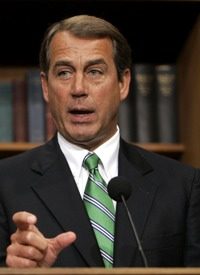
House Republican Leader John Boehner of Ohio wants to be Speaker of the House of Representatives; and he will most likely be Speaker if the GOP regains control of the House in the November elections.
Speaking at a July 21 lunch with reporters sponsored by the Christian Science Monitor, Boehner outlined the Republican plan for electoral victory and the ways in which a Boehner-led House would differ from the current Nancy Pelosi-led version. Most of what he had to say sounded encouraging, but given Boehner’s — and the GOP’s — recent history, it is difficult to take seriously.
According to John Parkinson of ABC News, Boehner said, “The election is going to be a referendum on job-killing policies that are coming out of this administration and our colleagues across [the] aisle. We’ve lost more than three million jobs since the stimulus bill was signed into law. Americans are sick and tired of spending, spending, spending, and not seeing any jobs as a result.”
Boehner is, of course, correct. But while he voted against the Democrats’ 2009 economic stimulus bill, he voted for the Republicans’ 2008 stimulus bill and for the bank bailout bill that created the Troubled Asset Relief Program, handing out $700 billion to politically connected financial firms at the executive branch’s discretion. Furthermore, the Republican alternative budget that Boehner offered up this spring cut not a single program and, in fact, proposed annual deficits of over $500 billion for every year through 2019 — shortfalls that, Thomas R. Eddlem pointed out in his report for The New American, “would be larger than any deficit in the entire history of the nation before 2008.” Thus, Boehner’s record provides little contrast to the spending spree for which he accurately chastised the current Congress.
Boehner cited Scott Brown’s victory in Massachusetts as proof positive that Republicans can win congressional seats, even in liberal districts. Brown’s victory may have been a success for the GOP, but it has hardly been one for conservative principles: Brown voted in favor of Democrats’ $15 billion “jobs bill” in February and their recent financial “reform” monstrosity. Getting more Scott Browns into Congress may put the Speaker’s gavel into Boehner’s hands, but it is hardly likely to put more liberty into Americans’ lives.
The Monitor’s Francine Kiefer asked Boehner: “If Republicans gain control of the House this fall and he gets the gavel, what are the three things he will do to create jobs?”
The first thing Boehner said he would do is to repeal ObamaCare, explaining: “Not only will [the health care bill] ruin the best health care system in world, it will bankrupt our country, and it stands in the way of employers who want to expand their employment. When you raise the cost of having an employee, you’re going to have less of them, and I think there are common sense reforms that we can enact that will bring down the cost of health insurance and help protect American jobs.”
Ridding Americans of ObamaCare, as Rep. Steve King (R-Iowa), Rep. Ron Paul (R-Texas), and other legislators are attempting to do, would be a welcome relief. Unfortunately, many of the “common sense reforms” that Boehner has proposed to put in its place aren’t much of an improvement, as this writer reported in a June 29 TNA article.
Boehner’s next job-creation initiative would be to prevent a cap-and-trade climate bill from being passed — yet another excellent suggestion, especially if Boehner’s contention (as reported by Kiefer) that the bill would “cost an estimated 2.5 million jobs each year for the next five years” is correct. However, Boehner then went on to say he was in favor of “more renewables, more oil exploration, more nuclear power,” as Kiefer described it. Renewable energy is just as much a government boondoggle as cap and trade. In an article for TNA, Rebecca Terrell described the fate of Spain’s renewable-energy program, which has been praised by President Obama for creating new jobs and new industries:
Dr. Gabriel Calzada Alvarez, professor of economics at King Juan Carlos University, sums up the cost of a decade of green energy subsidies in Spain: 2.2 jobs were lost for each of the 50,200 green jobs created, and 28.6 billion euros were spent. He told Heartland Institute conference attendees that public aid to renewables cost more in 2009 than electricity production for the entire country, noting that the unit cost of renewable energies is 3.3 times that of other energy sources. This misallocation of resources is certainly a contributing factor to Spain’s skyrocketing unemployment and public debt. The Institute for Energy Research, in its critique of Alvarez’s 2009 Study of the Effects on Employment of Public Aid to Renewable Energy Sources, said that “the United States should expect a worse return (measured in job creation) from its own subsidies to renewables.”
“Third,” wrote Kiefer, Boehner “would ‘not raise people’s taxes.’ By this, he means he would extend the Bush tax cuts. Knowing now that taxes won’t go up when they expire this year will help restore certainty. Uncertainty over the implementation of healthcare, cap-and-trade, and Wall Street reform is killing the jobs market.” Economist Robert Higgs called this scenario “regime uncertainty” and explained why similar uncertainty about federal policies during the New Deal prolonged the Great Depression.
Refusing to raise taxes is a good idea. The question is: Will Boehner merely prevent tax hikes while allowing spending to continue to spiral out of control, thus increasing the deficit? The eight years of Republican dominance in Washington under George W. Bush, combined with Boehner’s alternative budget mentioned earlier, seem to indicate that this is indeed the case.
According to Parkinson, Boehner said, “Our goal is to earn back the majority, and to renew our efforts for a smaller, more accountable government.” The former is believable; the latter is not. Boehner may have scored a cumulative 89 percent on TNA’s Freedom Index for the 111th Congress; but for the 110th, which covered the final two years of Bush’s second term, he only rated a 64 percent. Boehner’s commitment to smaller government seems to be inversely proportional to GOP dominance in Washington, and particularly in the White House.
Moreover, Boehner cited his bipartisan efforts with Rep. George Miller of California and the late Sen. Edward Kennedy of Massachusetts as a reason that he would make an effective Speaker of the House. The result of Boehner’s cooperation with Miller and Kennedy was the execrable, unconstitutional No Child Left Behind Act, which Boehner said was his “proudest achievement” in his entire political career. This is the man who is going to lead America into a new era of fiscal responsibility and “smaller, more accountable government”?
Boehner’s comments are likely the 2010 version of the same old rope-a-dope Republicans have been pulling on American voters for decades: promises of cutting government followed by few results. Only time, and electoral victory, will tell if the GOP is really serious about taming Leviathan this time around, but the odds are certainly not in favor of that proposition.
Still, a Republican takeover of the House with Democrats in control of the Senate and the White House would have one huge benefit: gridlock. If voters can’t quite tame Leviathan by electing Republicans this November, at least they can get the beast stuck in rush-hour traffic for a while.
Photo of Representative John Boehner: AP Images

